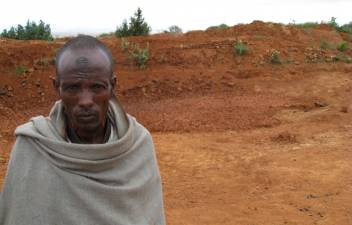Brendan Paddy is the Disasters Emergency Committee’s (DEC) Communications Manager. In 2011, the DEC East Africa appeal raised £75 million to help those affected by the severe drought and food crisis in the region.
A year after the appeal was launched, Brendan visited HelpAge projects in Ethiopia, which are funded by the DEC and its member Age International, part of the HelpAge global network.
 DEC member Age International and HelpAge International are supporting older people in southern Ethiopia affected by the 2011 drought with cash payments to help them recover and rebuild their lives. The project has been funded by the DEC East Africa crisis appeal and led to the building of water capture ponds as a resource for the community while providing paid work for family members of local elders.
DEC member Age International and HelpAge International are supporting older people in southern Ethiopia affected by the 2011 drought with cash payments to help them recover and rebuild their lives. The project has been funded by the DEC East Africa crisis appeal and led to the building of water capture ponds as a resource for the community while providing paid work for family members of local elders.
The 2011 drought led to the death of many livestock and crop failures, causing a food crisis in the Borena zone of southern Ethiopia. When a situation gets this bad older people are often particularly vulnerable, especially those without a wider family network who can support them in tougher times.
Role in the community
Age International through HelpAge has been using appeal funds to ensure that older people are able to play a full role in the community’s efforts to rebuild their lives. HelpAge runs two special cash grant projects reaching 996 and 923 vulnerable older people in the Borena Zone.
In the first part of the project, older people who didn’t have children over 18 who could help support them were given a payment equivalent to 700 Ethiopian birr a month (US$40).
The initial plan had been to pay the full amount in cash but upon consultation with the community, local people requested the payments be in the form of 50kg of maize, 5kg of haricot beans and 200 birr (US$11) in cash, which was mostly used to buy food items including sugar, tea and vegetable oil.
Cash for work
The second part of the project was a cash for work programme reaching 923 older people who have children over the age of 18 who could undertake paid work on their behalf. The young adults received training and new skills to help them rehabilitate six water storage ponds. These were needed to help both local people and their cattle survive the dry seasons.
Older people remained central to this project as they helped oversee the work and resolve any work related disagreements that arose. This work was paid for with the same package of 200 birr (US$11) and 500 birr (US$28) in food items as decided by the community.
Saving lives
Shukri Chellei, 56 years, was one of the elders who led the construction of the pond in Didmega village, just outside the town of Mega in southern Ethiopia. Speaking to the DEC he said:
“The aid we have received has helped us a lot, it has saved our lives. If this aid had not been given we would have had to sell our livestock and we would have no future. It also allowed us to keep our ability to move around to find pasture for our cattle.”
This life enhancing work by Age International and HelpAge means that the community is better placed to cope with future tough times resulting from poor rains.
The work in East Africa is funded directly from the donations DEC supporters gave to the appeal in 2011-12 and the money will continue to be spent over the next year improving lives of some of the people affected by drought.
Read more about HelpAge’s work to support drought affected older people in East Africa
